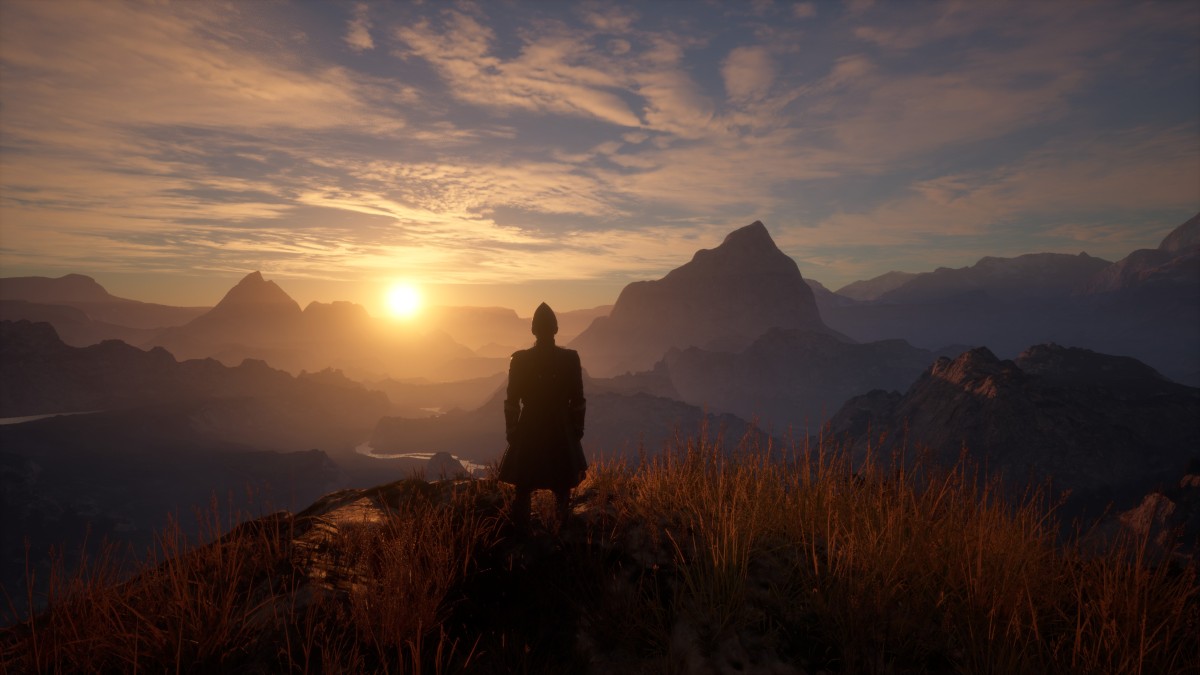
What is PAX DEI and what does the game offer?
The development studio Mainframe calls PAX DEI a social sandbox MMO.
On Steam, they describe the game as follows:
“Welcome to Pax Dei, a vast social sandbox MMO inspired by the legends of the Middle Ages. Here, myths are real, spirits roam the land, and the existence of magic is unquestioned. In this huge open world, you decide the role you want to play. Together with thousands of other players, dive into this fantastic world – explore the land, build your home, earn a reputation, and write your own stories.”
But what does all of this actually mean for us players?
Let’s take a closer look at the three tags mentioned here:
Social
In Pax Dei, great importance is placed on players interacting with each other — but also competing against one another. Communication and cooperation are at the forefront: you can join groups, clans, or even alliances.
→ This means: Pax Dei is primarily not a solo game; it thrives on social interaction and community projects.
Sandbox
“Sandbox” means the game gives players maximum freedom. There are no traditional NPCs handing out quests or acting as merchants. Everything — from trade to politics to warfare — is entirely in the hands of the players.
→ In Pax Dei, you can completely shape your own path: found a bank, a church, or a mercenary company, start a clan, or become the wealthiest ruler in the land. Everyone writes their own story — with no predetermined structure.
MMO (Massively Multiplayer Online)
Unlike smaller co-op games (such as Valheim, Enshrouded, or Dune), Pax Dei is a true MMO: all players exist on large, persistent servers hosted by the developer. Thousands of players are active simultaneously, creating a lively and dynamic world.
→ This means: you constantly encounter other players — whether as allies, rivals, or neutral trading partners.
Further points to note
While Pax Dei contains RPG elements, it is not a classic MMORPG. Therefore, it cannot be directly compared to titles like World of Warcraft (WoW), The Elder Scrolls Online (ESO), or Final Fantasy Online (FFO).
If comparisons are to be made, games such as EVE Online, Albion Online, Life is Feudal (LiF), or Wurm Online are a much better fit.
MMORPG
The term MMORPG stands for Massively Multiplayer Online Role-Playing Game. In traditional MMORPGs, players take on predefined roles (e.g., healer, tank, damage dealer) and usually follow fixed quest lines provided by NPCs.
→ By contrast, Pax Dei does not follow a linear quest structure. It is more of an open sandbox world where players themselves decide what role they want to take on and what stories they want to create.
GaaS
In addition, Pax Dei is a GaaS game (Games as a Service). This means:
- The game is not sold as a finished product, but operated as an ongoing service.
- Revenue (e.g., monthly fees or subscriptions) flows directly into maintenance, further development, and new content.
- Players benefit from regular updates, new features, and a constantly expanding world.
→ For Pax Dei, this specifically means: the world is persistent (it continues to exist permanently), and developers can continuously add content or adjust balancing — similar to EVE Online or Albion Online.
Note on Steam Tags (Example: Pax Dei)
On Steam, games like Pax Dei can be assigned so-called tags. There are two main places where tags appear:
- Under the short description in the store
- These tags mostly come from the community.
- They reflect how players describe the game (e.g., “MMORPG,” “PvP,” “Sandbox”).

- Tags suggested by developers
- Developers can propose their own tags when uploading via the Steamworks backend.
- However, these are usually less prominent than community tags.
Important to note:
- Tags on Steam can be chosen by players themselves.
- This sometimes leads to misunderstandings, as tags are very subjective.
Example: A game like Pax Dei may receive tags that don’t perfectly fit if enough players apply them.
How does a user add tags?
On a game’s store page → below the screenshots or beneath the short description, you will find “Community-added tags”.
- There, you can enter your own terms or click on existing ones.
- The more players choose the same tag, the more prominently it is displayed.
🎥 Video link: https://youtu.be/ES_3BEC-Dsc

